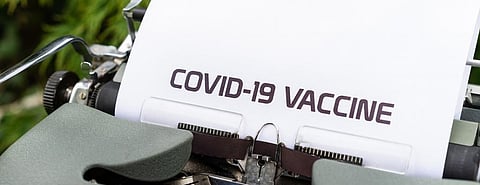

India will conduct the Phase-3 trial or bridging studies of the Russian novel coronavirus disease (COVID-19) vaccine Sputnik V, if needed, a government official said on September 8, 2020.
The Russian government had sought ‘help’ from India for large-scale manufacturing and also the Phase-3 trial, VK Paul, a member of the Niti Aayog, who is overseeing the Indian committee working on vaccines, said at a press conference in New Delhi.
The results of the vaccine’s Phases-1 and 2 were published in The Lancet last week and were taken by experts with a pinch of salt.
Whenever any foreign vaccine is to be launched in India, it has to first get a go-ahead from the Central Drugs Standards Control Organisation, Paul said. This requires either a Phase-3 trial or bridging studies. The Russian vaccine, if launched, would not be an exception, he added.
There is a significant difference between a full-fledged Phase-3 trial and a bridging study. While thousands of participants are recruited in case of the former, only a handful are done in the latter. Therefore, the scale at which these studies — Phase-3 or a bridging one — would be conducted, would be important to look at. Paul did not say anything about the scale and timeline.
“The Government of India attaches great attachment to the offer of this friendship from a very special friend. Three Indian companies have already come forward,” he said without naming them but added that ‘specific outcomes’ could be expected very soon.
The chief executive of the Russian Direct Investment Fund, Kirill Dmitriev had, on September 4, ‘appreciated’ the fact that instead of attacking their vaccine, the Indian government had tried to understand it. In the process of understanding, the government had realised that it was a vaccine with a safe platform.
Paul also said Indian scientists had already looked at the data of Phase-1 and 2 trials. However, he did not comment whether the data was satisfactory or not.
Meanwhile, many scientists from different countries, including the United States, Japan, Italy, Switzerland, Germany, France, Vietnam and Thailand, wrote an open letter to The Lancet editor Richard Horton on September 7, saying lack of original data in the published papers presented several points of concern.
“During the current pandemic, the public extreme interest and expectations for an effective vaccine are fully understandable. However, the very same reasons should motivate the scientific community to pay even more attention to the scientific evidence and the underlying data, and it is thus of utmost importance that they are fully available for close scrutiny,” the letter read.
“Numerical data for all the experiments and original FACS files in fcs format, for example, would be of great help in evaluating the present study, enabling to directly reproduce all analyses and findings, rather than trying to do so from data abstracted or inferred from the figures,” it added.
Paul also talked about the status of Indian vaccines. He said recruitment for the Phase-2 trial of the Bharat Biotech vaccine will begin September 9. The Zydus Cadilla vaccine trial is in Phase-2.
The Phase-3 trial of the Oxford University vaccine, on which Pune-based Serum Institute of India is to co-ordinate, will begin next week. It will be conducted in 17 sites, including Pune, Delhi and Chennai on 1,600 participants. Other countries like the US and Brazil are doing Phase-3 trial of this vaccine on 30,000 and 5,000 participants respectively.
The US Food and Drug Administration has made it clear it is looking for emergency use authorisation (EUA) for its vaccine. If EUA is granted to any product, it can be made available for public use without a Phase-3 trial in case of an emergency.
“It is too premature to say,” Paul said, when asked whether India would also do the same.
Andaman and Nicobar
The exponential rise in cases in India, to the tune of 90,000 every day, was due to an exponential rise in testing, officials present at the press conference, including Union Ministry of Health and Family Welfare Secretary, Rajesh Bhushan, said.
As many as 15 persons belonging to the Nicobarese tribe were still active cases in the Union Territory of Andaman and Nicobar (A&N) islands, Bhushan said.
There are six Scheduled Tribes in the A&N islands of which five fall under the category of Particularly Vulnerable Tribal Groups (PVTG). Six persons among the Great Andamanese, who live on Strait Island, had tested positive for SARS-CoV-2. However, all had recovered.
There are 200 Jarawas, who live in South, Middle and North Andaman. Some had been tested and no positive case was found. Similarly, no positive case had been reported among 100 Onges, who live in Little Andaman.
However, no test could be conducted among the Sentinelese and the Shompen as they are cut off from mainland. “There have been no reports of deaths or persons showing visible symptoms either,” Bhushan said. There are 312 active cases on A&N islands.
Paul made a strong appeal to citizens to avoid testing hesitancy. “We have liberalised testing but are getting reports that people are hesitant. This may be potentially dangerous not just for the patient himself or herself but for people at large,” he said.
“The stage in the pandemic that we stand at today, can worsen if people hide when symptoms show up. The survival rate is directly dependent on how early they get tested,” he added.
This becomes all the more significant because the virus is now moving from big cities to smaller towns and rural areas adjoining them. “The city-based health system will take a longer time to respond as several arrangements have to be done. So even a little delay in testing can cause,” he said.
Five states — Maharastra, Tamil Nadu, Karnataka, Andhra Pradesh — were contributing to 70 per cent deaths and 62 per cent cases, officials said.